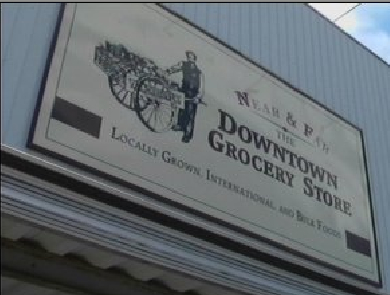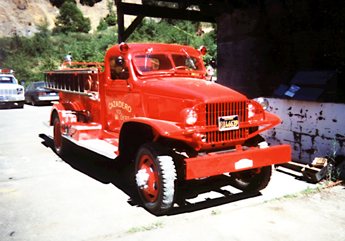When I was a student at Truman State University (then Northeast Missouri State) in Kirksville, Missouri, I would have loved to have access to a store like the planned “Near and Far, the Downtown Grocery Store. Locally Grown, International, and Bulk Foods.” I was a French major who loved to make French and Senegalese dishes with my friends, but I was limited to Walmart and Hyvee ingredients, as well as a strict budget.
 Now, many years later, and married to a food safety expert, I have to giggle at the subtitle of this new shop. I know locally grown food is all the rage. We attempt to grow our own vegetables, although we are admittedly pathetic gardeners (Sorenne popped off two of my baby eggplants on Sunday and said, “Baby crying. Baby happy”). The problem with buying into the myth of farmers markets is that while it is sold locally, it is not necessarily produced locally. When the farmers market opens here in late spring, it’s rather unlikely those huge tomatoes were grown outdoors in Manhattan, Kansas. Near and Far … that is how you get the best of produce, the best variety, the best quality, and who knows about food safety. Near or far – food safety has to be taken into account on the farm, wherever that farm may be.
Now, many years later, and married to a food safety expert, I have to giggle at the subtitle of this new shop. I know locally grown food is all the rage. We attempt to grow our own vegetables, although we are admittedly pathetic gardeners (Sorenne popped off two of my baby eggplants on Sunday and said, “Baby crying. Baby happy”). The problem with buying into the myth of farmers markets is that while it is sold locally, it is not necessarily produced locally. When the farmers market opens here in late spring, it’s rather unlikely those huge tomatoes were grown outdoors in Manhattan, Kansas. Near and Far … that is how you get the best of produce, the best variety, the best quality, and who knows about food safety. Near or far – food safety has to be taken into account on the farm, wherever that farm may be.
While the store’s name clearly represents what it is, the owner, Steve Salt (there aren’t many better names or beards for this line of business) reported to local Heartland news, “We’re going to try to stress locally produced foods. That will include fruits, vegetables, herbs, dairy products, meats, from the area surrounding Kirksville about a 50-mile-radius. Condiments, jams, jellies, baked goods.” Salt is apparently planning to use his own farm, year round, to provide produce.
Kirksville is surrounded by farming communities and there will undoubtedly be a decent supply of many locally grown items. It’s also great that they will be sold so close to campus, on the Square at 111 South Franklin. But Steve, please don’t make the students and faculty at Truman sick. Take into account the on-the-farm food safety practices, at your own farm and at neighboring farms. Be able to tell your clients not only where their food comes from, but how it was produced in a microbiologically safe environment.



 Recently news sources have focused on the question,
Recently news sources have focused on the question,